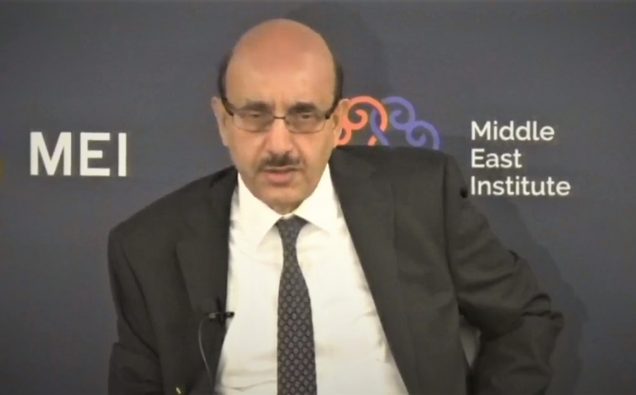
The world is not accepting New Delhi’s narrative on the festering Kashmir crisis, yet the powerful nations are not openly speaking up for the rights of the people in Indian controlled part of the disputed region, President of Pakistan-administered Jammu and Kashmir said.
Masood Khan, a former diplomat and now president of Azad Jammu and Kashmir – the Pakistani side of the region – said the challenge is to make powerful countries make a right moral choice to speak up for the rights of the oppressed people.
Citing his experience and interactions of the past, Khan said before August the 5th revocation of the Indian-administered Jammu and Kashmir and imposition of an unprecedented clampdown, people and experts, the “reception here on human rights situation in Kashmir was poor.”
But this time, the international media led by the American media have given immense space to Kashmiris’ narrative, they have highlighted the plight of the Kashmiris, and led by The New York Times and The Washington Post, the rest of the world has also sided with Kashmiris, he said during a discussion at the Middle East Institute in Washington.
“For the first time, India is being held accountable, its narrative is not being accepted — but challenged and criticized,” he said at the discussion moderated by MEI’s Director of Afghanistan and Pakistan Studies, Dr. Marvin Weinbaum. Raza Rumi, President of research organization, INDUS-Moblizing People’s Power, was also a panelist.
In his remarks, Khan noted that many Indian political voices and civil society organizations have condemned Prime Minister Narendra Modi’s August 5 actions.
Now the Modi government is seeking endorsement for its policies in order to get away from the atrocities in Kashmir.
Kashmiris are the least armed people in the world but they are not going to give up their struggle. He said the Kashmiris represent a just struggle for their right to self-determination.
While several members of the Parliament in Europe and US Congress members have called for effort to stop the carnage in Kashmir, only four states have demanded an end to Indian occupation, Khan noted.
He was referring to China, Malaysia, Turkey and Iran, who have taken an unequivocal stance on the need to address the worsening situation in Indian Kashmir.
“Our next challenge is how to break the silence of powerful governments —while the streets may be with us, official Washington, official Brussels and official London are not with us openly.”
President Khan explained that the challenge in terms of galvanizing international support for Kashmiri is to help the powerful world governments make the right moral choice to speak up for the rights of the people of Jammu and Kashmiris.
He appealed to the world to stop the Indian carnage and genocide in Kashmir, and stop India from robbing the Kashmiris of their rights to settlement, education, health and acquisition of territory.
“We all need to make collective efforts to stem this tide of violent extremism masquerading as a respectable doctrine.”
Referring to Indian militant organization RSS and its political party BJP’s extreme thinking and intentions to cleanse India of minorities including 200 million Muslims and large populations of Christians and Sikhs, he said this new doctrine of hatred is an existential threat to Kashmir, Pakistan and India.
“We would appeal to the international community to clearly declare the (August 5) steps taken by India as illegal and they should put pressure on India to reverse them.”
“We must find ways to resolve the Kashmir dispute because that is the trigger, the casus belli.”














